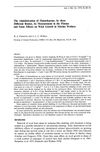
Search
for
Sort by
Research
630-660 / 1000+ results

research Implication of Human Bacterial Gut Microbiota on Immune-Mediated and Autoimmune Dermatological Diseases and Their Comorbidities: A Narrative Review
An imbalance in gut bacteria is linked to skin immune diseases and may affect their outcomes and related health issues.

research Roles of Wnt7a in Embryo Development, Tissue Homeostasis, and Human Diseases
Wnt7a protein is crucial for development and tissue maintenance and plays varying roles in diseases and potential treatments.

research In Vivo Penetration of Bare and Lipid-Coated Silica Nanoparticles Across the Human Stratum Corneum
Lipid-coated silica nanoparticles penetrate human skin more deeply than bare silica nanoparticles.

research Use of Metformin in Pediatric Age
Metformin helps manage diabetes, PCOS, and weight in kids but needs more research for long-term safety.

research Therapeutic Options in Polycystic Ovary Syndrome
The document suggests various treatments for PCOS, including medication for menstrual issues, insulin resistance, and excess hair, as well as fertility treatments, while highlighting the need for personalized care and lifestyle changes.

research Green Fabrication of Seedbed-Like Flammulina Velutipes Polysaccharides-Derived Scaffolds Accelerating Full-Thickness Skin Wound Healing Accompanied by Hair Follicle Regeneration
Mushroom-based scaffolds help heal skin wounds and regrow hair.

research Ranitidine And Finasteride Inhibit The Synthesis And Release Of Trimethylamine N-Oxide And Mitigate Its Cardiovascular And Renal Damage Through Modulating Gut Microbiota
Ranitidine and finasteride lower TMAO levels, reducing heart and kidney damage by changing gut bacteria.

research Increased Risk of Fractures in Patients with Polycystic Ovary Syndrome: A Nationwide Population-Based Retrospective Cohort Study
Women with polycystic ovary syndrome have a higher risk of certain fractures.

research Gynecologic and Andrologic Dermatology and the Metabolic Syndrome
Skin diseases linked to insulin resistance should be managed to prevent diabetes and reduce heart disease risk.

research Reversal of Alopecia Universalis by Tofacitinib: A Case Report
Tofacitinib, an arthritis drug, helped hair growth in alopecia universalis but long-term safety needs more research.

research Targets to Treat Androgen Excess in Polycystic Ovary Syndrome
The conclusion is that while oral contraceptive pills are effective for PCOS-related high androgen levels, new treatments with fewer side effects are needed.

research Nutraceutical and Functional Scenario of Wheat Straw
Wheat straw is valuable for its health benefits and various industrial uses.

research Diagnosis and Management of Infertility in Women With Polycystic Ovary Syndrome
Women with PCOS-related infertility can often conceive with treatments like clomiphene and metformin, but managing pregnancy complications is important.

research Platycarya Strobilacea S. Et Z. Extract Has a High Antioxidant Capacity and Exhibits Hair Growth-Promoting Effects in Male C57BL/6 Mice
Platycarya strobilacea extract is a strong antioxidant that can grow hair better than minoxidil.

research In Vivo and In Vitro Hair Growth-Promoting Effect of Silver and Iron Nanoparticles Synthesized via Blumea Eriantha DC Plant Extract
Silver nanoparticles can significantly promote hair growth.

research Single-Cell Profiling Reveals a Potent Role of Quercetin in Promoting Hair Regeneration
Quercetin significantly helps hair growth by activating hair follicles and improving blood vessel formation around them.

research Integrated Model of Care for Polycystic Ovary Syndrome
The document concludes that women with PCOS need a comprehensive care model that covers reproductive, metabolic, and psychological health to improve their quality of life.

research Polycystic Ovary Syndrome: Features, Diagnostic Criteria, and Treatments
PCOS is a long-term condition that needs more research for better understanding and treatment.

research Treatment of Androgen Excess in Females: Yesterday, Today, and Tomorrow
The document concludes that treating androgen excess needs patience, managing expectations is important, and many drugs used are not officially approved, suggesting cosmetic options for mild cases.

research The Administration of Flumethasone by Three Different Routes, Its Measurement in the Plasma, and Some Effects on Wool Growth in Merino Wethers
Flumethasone causes wool shedding in Merino wethers, with recovery in about 60 days.

research Why Were Sardinians the Shortest Europeans? A Journey Through Genes, Infections, Nutrition, and Sex
Sardinians were historically short due to a mix of genetics and factors like disease and poor nutrition, but recent height increases suggest better living conditions had a bigger impact.

research Male Pattern Baldness and Risk of Colorectal Neoplasia
Men with certain types of baldness at age 45 may have a higher risk of colon cancer and colorectal adenoma.

research Acne and Its Management
Acne is a chronic skin condition not caused by poor hygiene or diet, and it requires long-term treatment and patient education.

research Hereditary Vitamin D Rickets: A Case Series in a Family
Three siblings with a genetic form of rickets showed different symptoms of the disease.

research Structure and Function of the Skin
The skin has multiple layers and cells, serves as a protective barrier, helps regulate temperature, enables sensation, affects appearance, and is involved in vitamin D synthesis.

research The Effects of Smoking on Hair Health: A Systematic Review
Smoking is linked to more hair loss and premature graying compared to nonsmokers.

research Plasma Zinc Levels in Males with Androgenetic Alopecia as Possible Predictors of Conservative Therapy Effectiveness
Lower zinc levels may predict less effective hair loss treatment.

research Effects of Exercise Combined with Finasteride on Hormone and Ovarian Function in Polycystic Ovary Syndrome Rats
Exercise and finasteride together improve ovary health in PCOS rats.

research PCOS: Perspectives from a Pediatric Endocrinologist and a Pediatric Gynecologist
The document concludes that early and personalized treatment for PCOS in adolescents is crucial to manage symptoms and prevent long-term health issues.